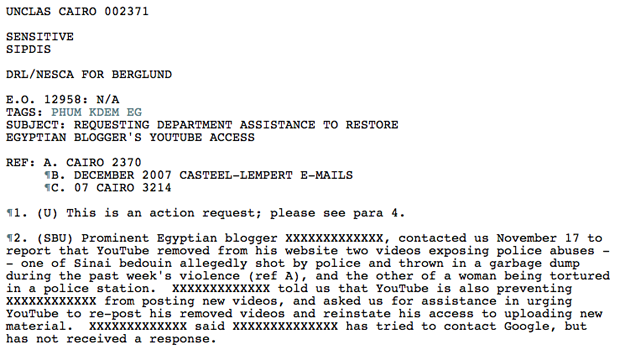
In response to the escalating Mubarak protests, the latest release of WikiLeaks have been Egypt or MENA related. One cable from November 2008 is particularly interesting, revealing that the State Department spoke to YouTube in 2007 regarding the takedown of videos posted by Egyptian bloggers. The cable is an action request for the State Department to contact someone named Pablo at Google (their General Counsel perhaps?) in order to have Google reinstate access to an Egyptian blogger who had complained about removed videos and access when he reported on police abuses.
Apparently this action request has a precedent. According to the cable, YouTube and the State Department talked about the removal of video content that exposed abuses in Egypt before, in December of 2007.
¶3. (SBU) In December 2007, DRL and Embassy Cairo worked to convince Google to restore XXXXXXXXXXXXX’ YouTube access after a similar incident. We believe that a similar Department intervention with Google representatives could help in restoring XXXXXXXXXXXXX’ access again. XXXXXXXXXXXXis an influential blogger and human rights activist, and we want to do everything we can to assist him in exposing police abuse. XXXXXXXXXXXXX’ post of a video showing two policemen sodomizing a bus driver was used as the main evidence to convict the officers in November 2007 (ref C).
The cable does not reveal why the video content was taken down, and it could be anything from a specific request from the Egyptian government to enforcement of YouTube’s Terms of Service, specifically, “Graphic or gratuitous violence is not allowed …” The TOS violation charge is probably applicable to a video of policemen sodomizing a bus driver, someone being shot and a woman being abused, the examples referred to in the leak.
Apparently Google was convinced to restore the content in 2007, which means it probably had to make a TOS exemption in the cases of content that could be used as evidence in human rights abuse cases.
The State Department has contacted American Internet companies about restoring service in times of political turmoil before, most notably in the case of Twitter and the Iran election protests. But at the time Egypt was a major non-NATO ally to the United States, so even the smallest attempts to intercede on behalf of democracy are impressive.
I have contacted Google and YouTube for more information as to what actually happened here and will update this post if I hear back.
Update: Gawker’s Adrian Chen points out that the blogger in question in the 2007 case was Wael Abbas who has been documenting prisoner abuse on YouTube for years.